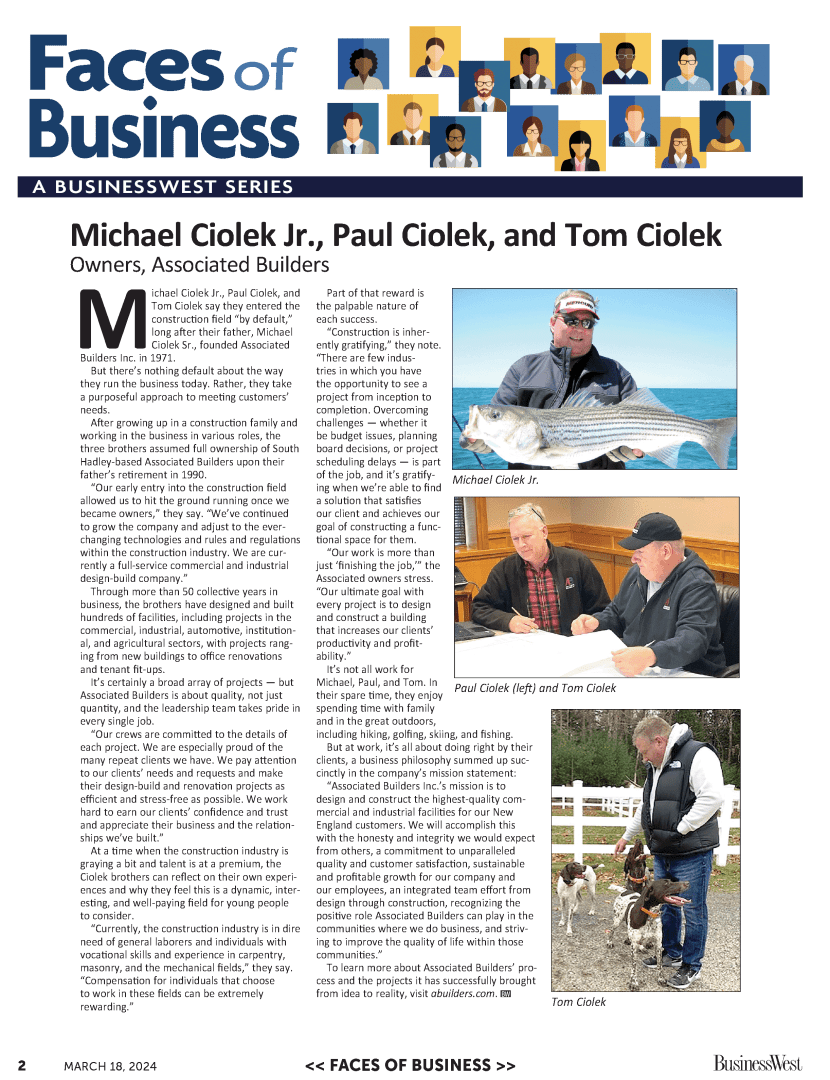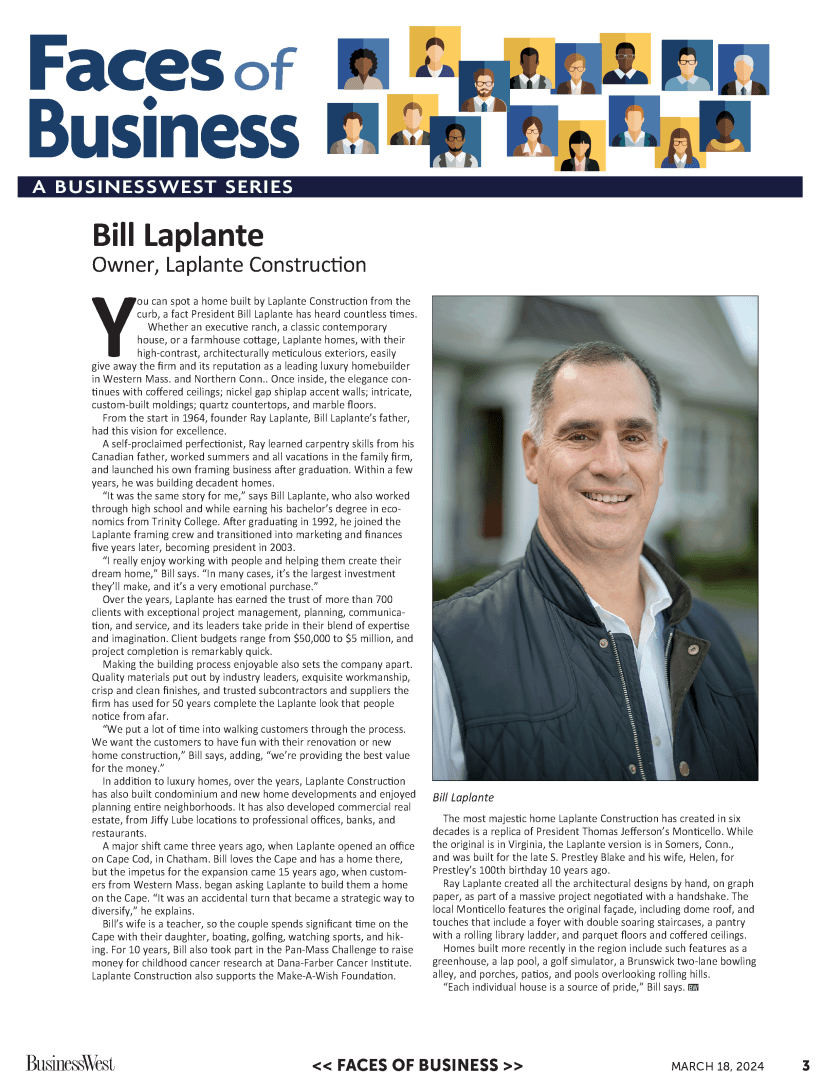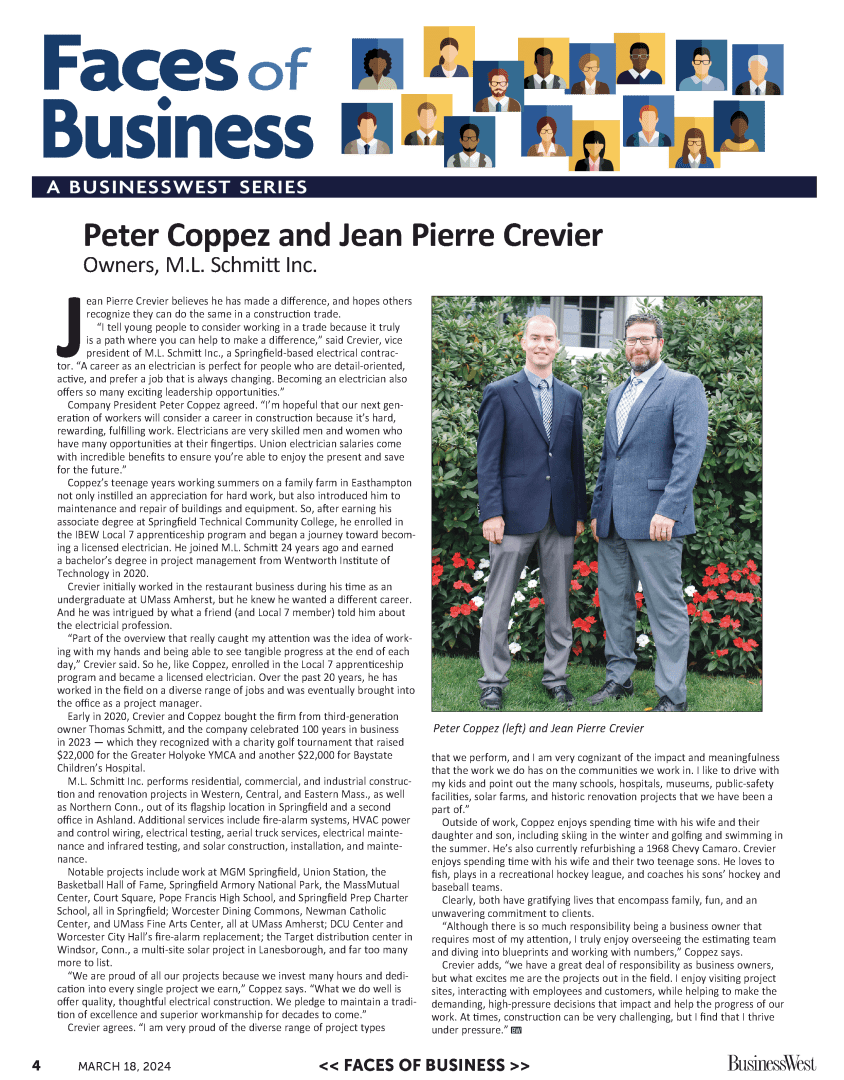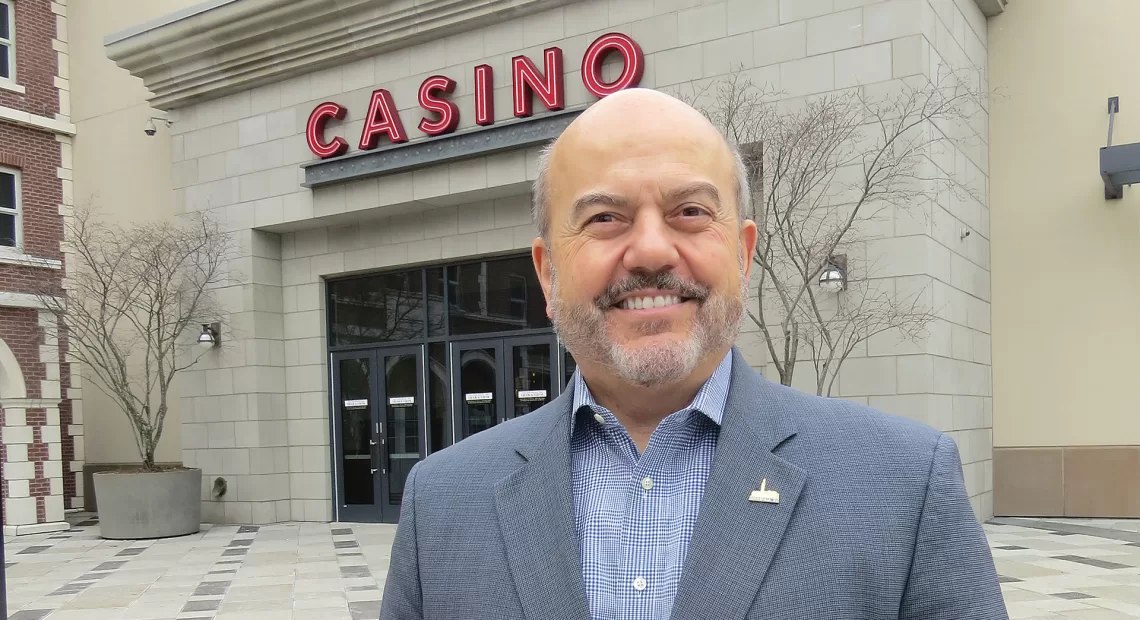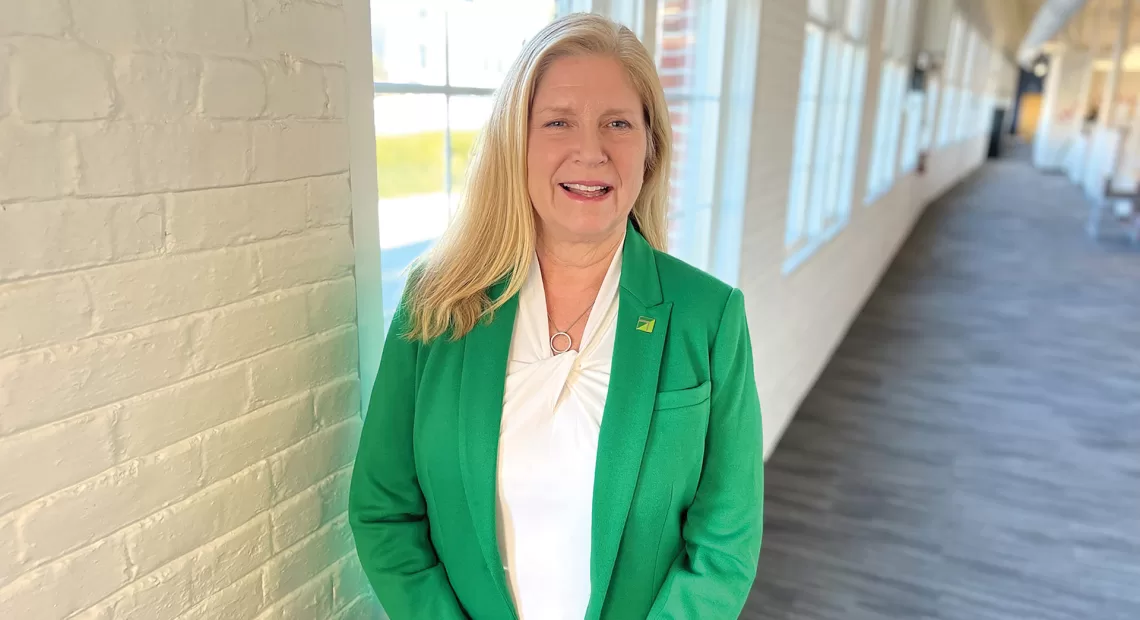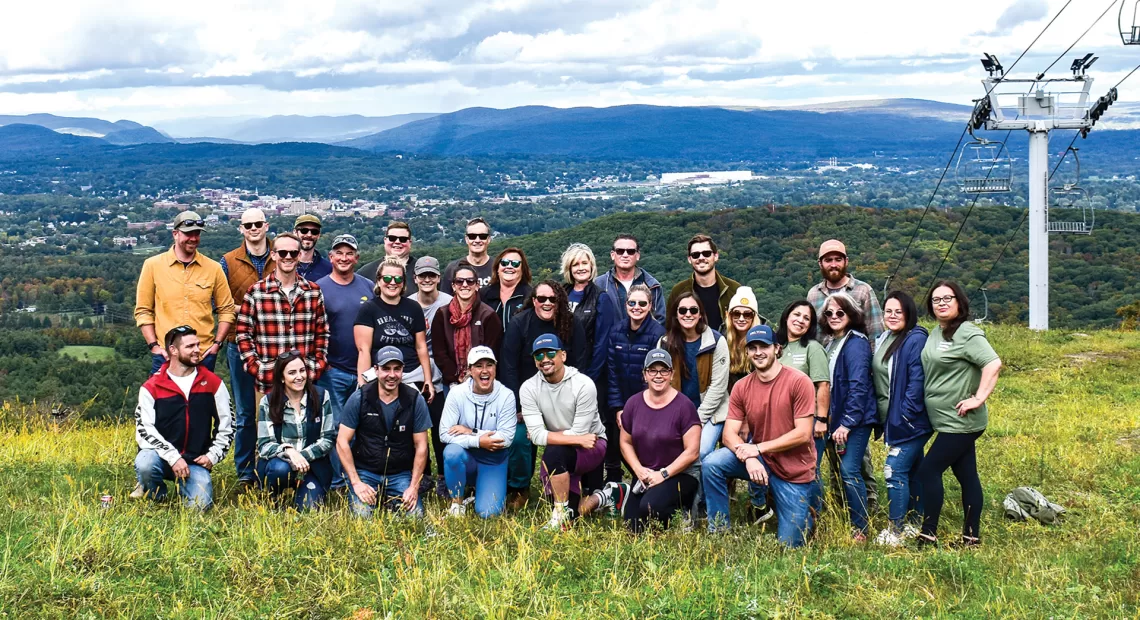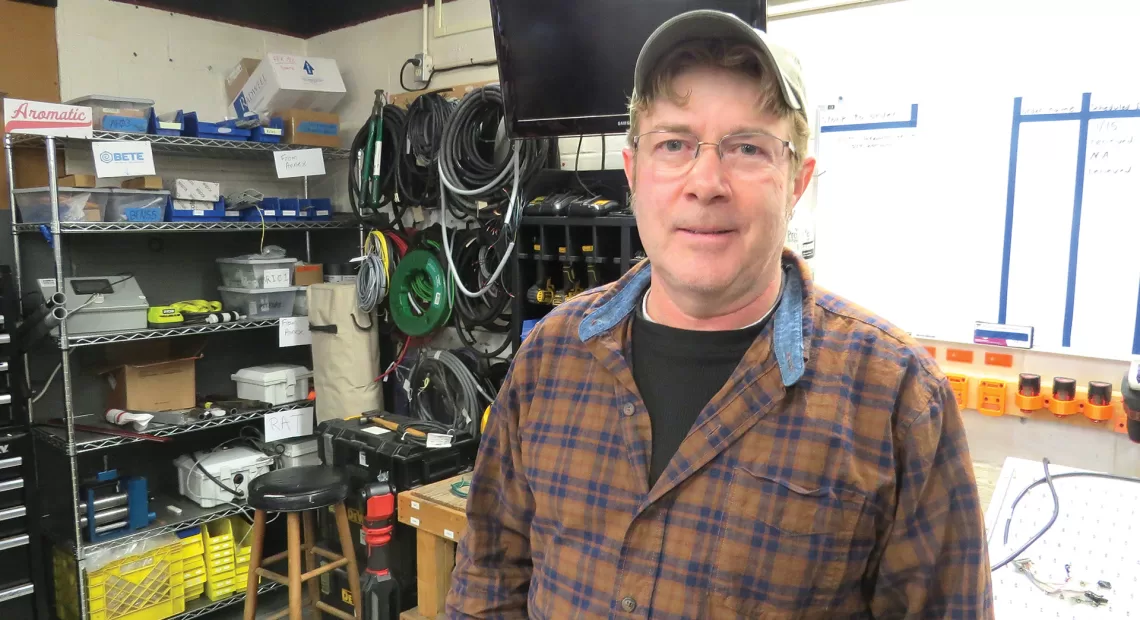Day: March 14, 2024
FLORENCE — Keiter, a construction-services firm located in Florence since 2008, recently announced it will relocate its executive headquarters to a 6,000-square-foot facility at 1 Interstate Dr., West Springfield later this year.
Keiter is comprised of Keiter Builders, the commercial/institutional division; Keiter Homes, the residential arm; and Keiter Properties, the real-estate venture. Its pre-construction, sales and marketing, finance and administration, and operations departments will be located in the new space.
The move is prompted by growth and will allow Keiter much-needed space to collaborate with customers and partners on projects.
“We have purposely grown our company over the past few years to better serve the needs of our customers and the broader community,” CEO Scott Keiter said. “Keiter needs to continue growing in other ways so we can continue to meet the needs of our customers, employees, partners, and communities.”
The new location will also help Keiter better serve clients in Hampden and Berkshire counties while continuing to serve clients in Hampshire and Franklin counties.
“The move will be phased in,” said Keiter, who is one of BusinessWest’s 2024 Difference Makers. “Keiter will continue to service all of its clients and customers in a business-as-usual way. We will not skip a beat. We are excited to make this move and look forward to growth and expanding our reach.”
PITTSFIELD — Dulye Leadership Experience announced its next Culture Chat program, “Build a Better Relationship with Your Boss,” a one-hour, virtual event taking place on Friday, April 12 at noon.
Seasoned leadership coaches Jeff Schreier and Janet Forest will provide actionable advice for mending differences through better communication, collaboration, and self-awareness. The interactive Culture Chat format features a mini-workshop with the experts followed by small-group discussions.
There is no fee to attend, thanks to the sustained sponsorship of Dulye & Co. consulting firm. Click here to register.
WESTFIELD — Tighe & Bond announced the opening of a new office in Troy, N.Y. Located at 433 River St. in the Hedley Building, this location will allow the firm to better service its growing base of clients in the Albany region.
Tighe & Bond’s newest location brings the firm’s total office count to 16 throughout the Northeast and is the firm’s second New York location, in addition to the Hudson Valley office located in Rhinebeck. Vice President Erin Moore will provide leadership for the establishment of the Troy office as location manager. A lifelong resident of New York’s Capital District, with more than two decades of experience in municipal water, wastewater, and stormwater projects, she has been actively engaged in expanding Tighe & Bond’s services throughout New York in response to clients’ needs.
“Establishing a base in Troy allows us to better meet the needs of our clients in the Capital Region and offers the opportunity to expand to meet client demands in that geography,” Tighe & Bond President and CEO Bob Belitz said. “Our team has been working to grow our client base and employee count in New York, and this new office location is a natural step in that expansion.”
SEATTLE — Work/life balance is becoming increasingly important in today’s world, and a new study reveals which states have the best and worst balances, with Massachusetts topping the list.
The study, by AI productivity platform Plus Docs, analyzed Bureau of Labor Statistics data and looked at the average weekly hours worked, as well as average weekly earnings, in order to give each state an index score out of 100 for how good — or bad — its work/life balance is.
Massachusetts takes the top spot on the list, with a work/life balance score of 60.29 out of 100. With the highest average weekly income ($1,329.02 per week) and, as a result, the highest average hourly wages ($39.32 per hour), the people of Massachusetts were found to be among the states with the lowest average weekly hours worked, working only 33.8 hours per week on average.
Rounding out the top five, in order, are Washington, California, New York, and Alaska. Mississippi was found to be the state with the worst work/life balance, scoring only 0.19 out of 100. In Mississippi, the average person works 34.6 hours a week and earns only $829.71 per week.
“The study highlights significant variations in work/life balance across different U.S. states. Massachusetts takes the lead with a notably high index score, showing a fine balance between working hours and earnings,” said Daniel Li, CEO and co-founder of Plus Docs. “In contrast, at the lower end of the spectrum, Mississippi indicates a distinct pattern with lower weekly wages and a relatively higher number of weekly hours worked. These findings underscore states’ diverse approaches in managing the delicate balance between professional commitments and personal time.”
Making His Case
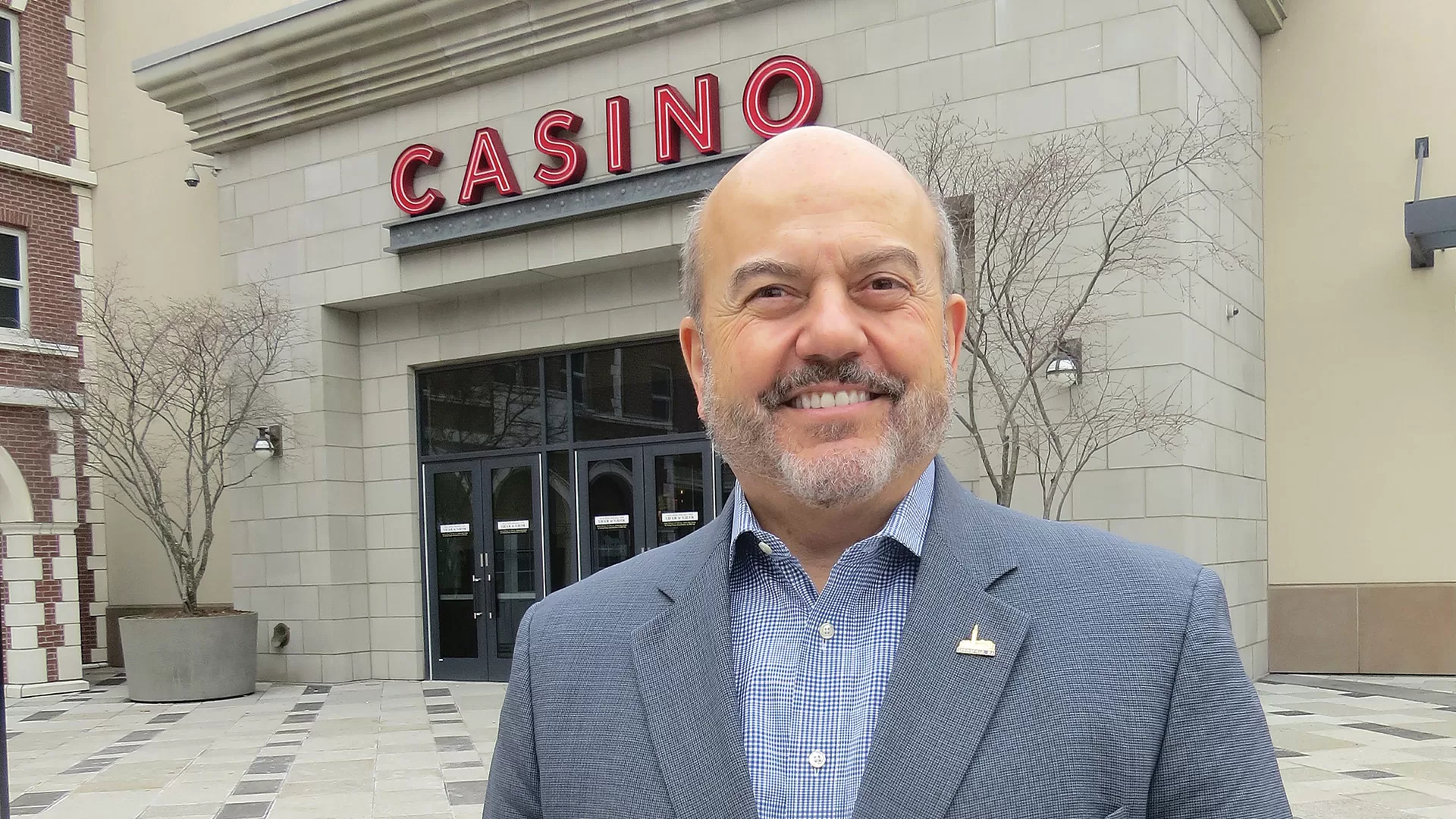
Louie Theros
Louie Theros is a trial lawyer by trade. In fact, his wife has told him on numerous occasions that she has never seen him happier than when he’s in the courtroom trying a case.
He would agree with that assessment wholeheartedly.
“I loved the strategy of it and sitting down with my colleagues and working themes of cases,” he told BusinessWest. “How we were going to deal with the opposite side’s parries, changes in strategy, and how we had to learn and deal with the jury and get them to like us and our case. I loved everything about it.”
But while he’s energized by the various elements of a courtroom fight, he acknowledged that his current challenge is probably the biggest and most intriguing of his career.
Indeed, Theros has seen his most recent career aspiration come to fruition with his appointment as president and chief operating officer of MGM Springfield, succeeding Chris Kelley, who held that role for four challenge-laden years (he arrived not long before the pandemic descended on the region) before departing at the end of 2023.
Prior to his arrival in Springfield, Theros served MGM as vice president, legal counsel, and assistant secretary at MGM Grand Detroit, and then in those same roles for MGM’s Midwest Group, which also included a casino in Ohio. In those various positions, he said he learned all aspects of the casino business, and especially what he called the “human-resources side,” a natural byproduct of working in employment law for 25 years before joining the casino giant and then continuing that type of work.
“I’ve told people here during my first few weeks that I’m sort of a ‘culture person,’” he said. “I’ve been on the human-resources side my entire career, working with a variety of companies, spanning Fortune 10 corporations to single-person entities, and I’ve learned a lot about the human element. So one of my goals here is to drive culture among employees and between our hourlies and our managers.”
“When we designed this … we didn’t design a glass, Vegas-like place; this fits into the community. Corporate-wise, we really felt the vibe of Springfield, and we really paid a lot of attention to this fitting into the community.”
That’s one of many goals he brings with him to MGM Springfield, where he becomes the third president and COO of that facility. He acknowledged that his predecessors, Mike Mathis and then Kelley, had specific assignments.
Mathis’s was to open the facility — a four-year process that ended in August 2018 — and then put it on solid ground. Kelley was then charged with ramping up, he said, adding that this process was complicated by COVID and then dominated by the introduction of sports gambling.
Generalizing, Theros said his assignment is to build on the foundation that’s been laid and simply try to improve on every aspect of the operation, a long list that includes the gross gambling revenue (GGR) generated at the facility, the entertainment shows at various venues, and the broad impact MGM Springfield has on the surrounding South End area and the region in general.
There are already some items on his to-do list — reactivating the former church that was home to a Kringle Candle outlet but has been vacant for several years, energizing the hotel’s spa, and adding to the entertainment calendar, for example — but mostly, at this early stage, he’s still watching, learning, getting to know the region, and, overall, setting the bar higher for the casino complex.

As Louie Theros takes the helm at MGM, he senses growing momentum, both at the casino complex and in Springfield’s South End.
(Photo by Jose Figueroa)
“This should be the best that Springfield has to offer — we have the resources to have the best steakhouse, the best Italian restaurant, the best food court, the best experience for someone who’s looking for something exciting to do on any night of the week,” he said, adding that, in most respects, the casino is already there, and with the others, it’s his job to get it there.
For this issue, BusinessWest talked at length with Theros about everything from the path he took to Springfield to what he wants to do with this opportunity to oversee his own casino.
Odds Are…
Theros is certainly no stranger to Springfield and its casino. Indeed, he came here during the pandemic to help prepare the facility for its reopening and was also part of the large team that opened the facility five and half years ago.
“I spent two weeks here then,” he said, gaining during that brief stint an appreciation for the property, what it meant to Springfield and the region, and the role it would play in helping to transform that section of the city.
“I’ve always loved this building,” he said, adding that his affection reflects both what the property is and what it isn’t. “When we designed this … we didn’t design a glass, Vegas-like place; this fits into the community. Corporate-wise, we really felt the vibe of Springfield, and we really paid a lot of attention to this fitting into the community.”
Overall, his role is to continually improve that ‘fit,’ and to build on a general sense of momentum at both the casino and the area surrounding it, punctuated by everything from solid GGR numbers to the recent naming of a preferred developer — Chicago-based McCaffrey Interests Inc. — for three properties across Main Street from the casino that have long been vacant or mostly vacant and in most ways eyesores.
Theros, who officially took the helm on Jan. 2, navigated a winding and somewhat unusual path to casino management.
He graduated from Vanderbilt University Law School in 1989, returned to Michigan, where he grew up, and soon thereafter began practicing civil-rights law on the defense side, handling human-resources and labor issues for clients of all sizes, including, eventually, MGM Resorts, which had opened a casino in Detroit in July 1999.
He handled work for the company for several years before joining MGM as one of its in-house lawyers in 2015, eventually becoming vice president, legal counsel, and assistant secretary, first for the Detroit casino and then for the Midwest Group.
Prior to joining MGM, though, he served on the board of the Detroit-based law firm he was with, Butzel Long, getting a taste, as he put it, of operating a large business.
“This was an $80 million to $90 million law firm at that time, and now, it’s much bigger,” he noted. “I really like operations, and I always have.”
Indeed, he said that, from the days he would bus tables for some of the Greek restaurant owners in town who counted his parents as their accountants, he’s always had a fascination for the operational side of companies and knowing and understanding every facet of a business.
“People have put their trust in me to lead this organization and lead this property into the future, and I really feel privileged to do this.”
And this fascination continued with MGM’s Detroit casino, he said, adding that he chose to stick his nose, as he put it, in places generally not frequented by in-house lawyers.
“I was very deliberate in educating myself about all aspects of a casino during my eight-plus years in Detroit,” he told BusinessWest. “I spent a lot of time socializing, whether it was having a cup of coffee with someone from table games or the slots department. And the food and beverage leader and VP of Hospitality were right next door to my office, so I spent a lot of time talking about that aspect of the business.”
And many others as well, he went on, adding that, as he acquired this broad base of knowledge, he arrived at a place where he believed himself ready to lead his own casino. He applied for such a role at MGM’s Ohio facility, and while he didn’t get the job, he said he certainly sharpened his teeth through the lengthy interview process and then “did some more learning.”
And when Kelley, with whom he worked at MGM’s Detroit casino, announced he was leaving his role in Springfield late last year, Theros applied again, and this time won the position. It’s a role, and a challenge, that he embraces.

One of Louis Theros’s challenges will be to build on MGM Springfield’s newest gaming option: sports betting.
“People have put their trust in me to lead this organization and lead this property into the future, and I really feel privileged to do this,” he said. “I would most likely have run my law firm if I had stayed there, if I had not come to MGM — I was one of the top two or three people running the firm when I was there — and I’ve always felt the desire to lead some organization, and when I got to MGM and learned the business and got more involved in it, a few years in, I said to myself, ‘I know I can do this.’ I’m honored that they picked me to do this.”
Betting on Himself
When asked to informally write his own job description for the president and COO of MGM Springfield, Theros said there are two sides to that equation — internal and external.
With the former, he said his job is to set a positive tone for the staff, something he believes comes naturally. “I’ve always been a ‘set a positive tone at the top’ person,” he said. “And I would never ask my employees to do something I would not do, and I expect my leaders to set that same tone.
“And I want people to feel, as I do, that this is an absolutely fantastic place to work — I love coming to work every day,” he went on. “So, my job is to come in, make sure our employees like coming here and treat everyone with respect, and make sure they have an opportunity, much like I’ve had, to move up in the company.”
On the external side of the equation, he said his job description involves creating an experience for the guest and prompting them to put MGM Springfield top of mind when it comes to gatherings and ways to celebrate occasions and milestones in their lives — or just or a random Saturday evening.
“When they’re thinking of a special event — an anniversary, a birthday party, whatever it is — we want them thinking, ‘we should go to MGM Springfield because it’s a wonderful place to go, we get great service, and we could get great food.’ My job is to deliver that.”
Theros said it’s also his job to get involved in the community, and to inspire others to get involved as well.
Overall, he’s encouraged by what he sees, both at his casino and in the community, citing everything from apparent progress on the properties across Main Street, including the Clocktower Building and the Colonial Block, and the rapid leasing of the apartments in the revitalized former Court Square Hotel (a project MGM has taken part in), which is a source of pride but also some frustration for Theros, who has been looking for a place a live.
“At 31 Elm, they have 74 units; they rented them all in 30 days,” he said. “I couldn’t find a place, even across the street. That’s fantastic; that shows me that the city and the surrounding area are really robust.”
Theros’s personal car didn’t arrive in Springfield until late last month, but he made use of the casino’s limo to visit various communities in the region — and even one of his competitors — while also walking to events ranging from a few Thunderbirds games to Red Sox Winter Weekend at the MassMutual Center.
“At 31 Elm, they have 74 units; they rented them all in 30 days. I couldn’t find a place, even across the street. That’s fantastic; that shows me that the city and the surrounding area is really robust.”
Returning to his casino property and the multi-faceted operation there, Theros said that, to date, he’s mostly been observing and making notes as he compiles a more comprehensive to-do list. He stressed that the operation is maturing and reaching, if not exceeding, many of the expectations the city and region had when the casino opened to considerable fanfare on that hot August day in 2018.
“Chris [Kelley] has gotten us to a nice place; the whole team has,” he told BusinessWest. “My goal, quite simply, is to build on that.”
Bottom Line
When asked what he’d rather be doing — trying a case or managing a casino — Theros paused briefly before answering.
“For pure adrenaline, trying a lawsuit, trying a case in front of a jury — that’s an adrenaline rush,” he said. “When someone high-fives you after you’ve cross-examined someone — I had one of my associates do that — that’s a big rush.
“For personal satisfaction, though, it’s running a casino,” he went on. “I have more direct impact on an outcome here than I do at a trial because the jury is the arbiter at the end of the day.”
Still, he’s hoping to create something approaching those cross-examination rushes at the casino on Main Street as he takes on what he called the “cherry on the top of his career,” and an opportunity to really make a case for MGM Springfield.
Community Interest
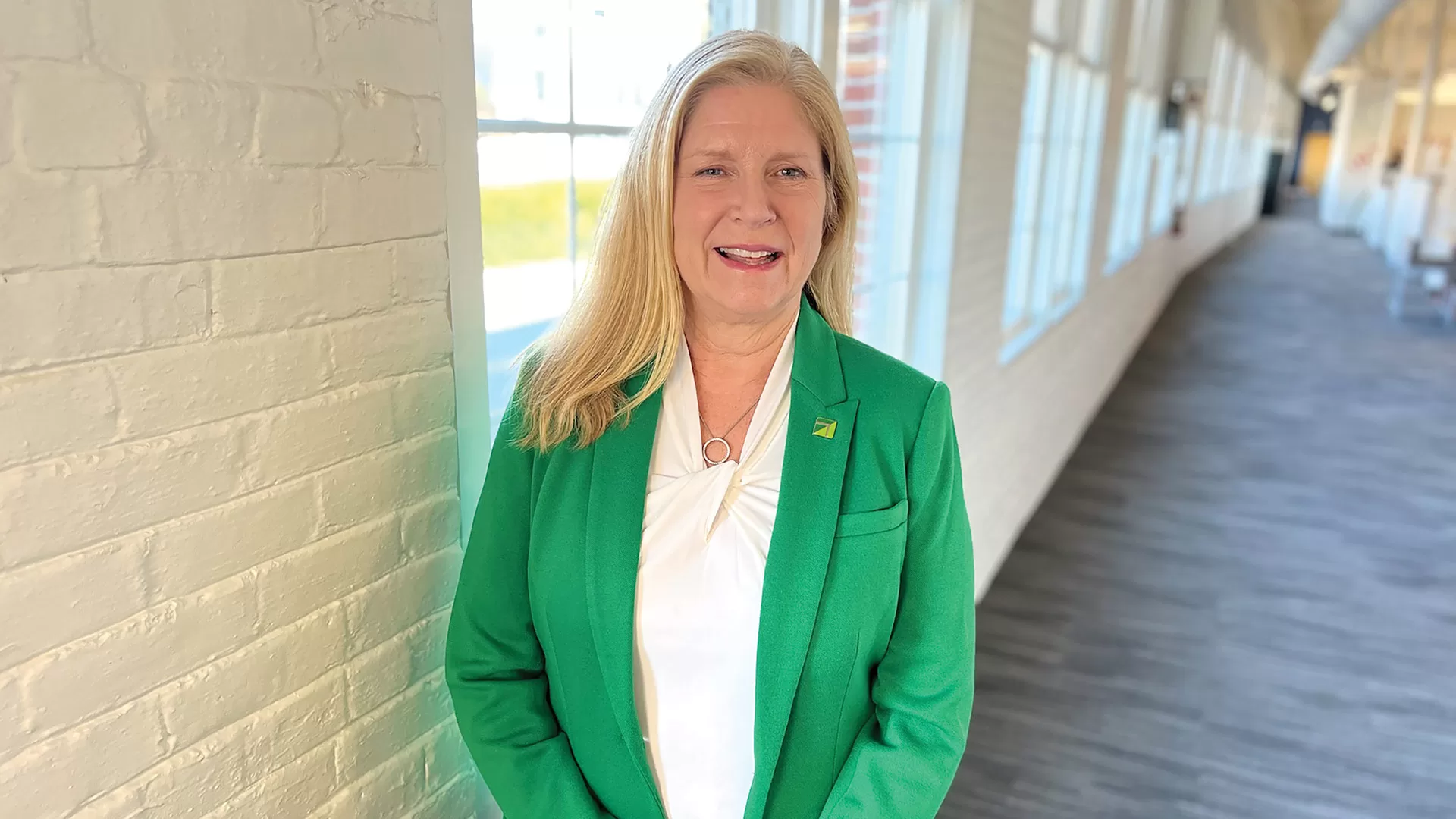
Mary McGovern, incoming president of Country Bank.
When asked why Country Bank supports local nonprofits, incoming President Mary McGovern gave a simple answer. “It’s a way for us to make a difference in our community.”
Then she elaborated.
“We have a tagline we adopted two years ago, ‘made to make a difference.’ We feel that encapsulates what Country Bank is all about, trying to make a difference in our community. It’s something we’ve done over the history of Country Bank, and we continue to make a positive impact by supporting local nonprofits, specifically the kind that rely on donations from their local businesses to help support them.”
Those efforts have focused in recent years on a number of priorities, she added, including food insecurity, health, education, and financial literacy, as well as homeless shelters, senior-serving programs, youth organizations, and more.
To that end, Country reported more than $1.2 million in donations in 2023, with 463 organizations receiving grants. One highlight last year was a partnership with (and $30,000 donation to) the Wonderfund, which aims to improve the lives of individuals in the Department of Children and Families system.
That large number of supported nonprofits resonates with Matt Bannister, senior vice president of Marketing and Corporate Responsibility at PeoplesBank, who was named a 2024 Difference Maker by BusinessWest last month for his extensive role in the bank’s community-support efforts. PeoplesBank recorded $1.6 million in donations last year to more than 550 area nonprofits, making the average grant just under $3,000.
“We continue to make a positive impact by supporting local nonprofits, specifically the kind that rely on donations from their local businesses to help support them.”
“We give a little to a lot of groups. We don’t tend to do large capital campaigns,” he said. “One big ‘yes’ often means a lot of little ‘no’s.’ So many nonprofits out there are doing good work, so it feels wrong to say ‘no’ to people.”
So, outside of a few big splashes — like a major donation to help the Food Bank of Western Massachusetts build its new headquarters — spreading the wealth around is a guideline the bank tends to stick with.
“The overall philosophy for our funding is we want to level the playing field — give opportunities to those who are disadvantaged and need more help,” Bannister added. “We have funding areas — food insecurity, housing, economic development, etc. — and the overarching principle of all these funding areas is to level the playing field.”
Many area institutions share their donation figures each year; Pittsfield Cooperative Bank donates nearly $200,000 — a striking number, considering it boasts around $385 million in total assets — through its charitable contributions to regional scholarships, youth mentorship programs, and nonprofit, economic-development, and health and human-service organizations.
Meanwhile, the Liberty Bank Foundation granted $1,453,742 to local nonprofits in 2023, including $10,000 as an annual ‘holiday gift’ from the bank, with the recipient chosen by bank customers. And Greenfield Savings Bank (GSB) gave more than $1 million in 2023 to more than 300 organizations.
Peter Albero, GSB’s chief financial officer and treasurer, noted that, while profits have been challenged over the past couple years by rising interest rates, the bank has not cut back on its financial support in the community, or its level of employee volunteerism.
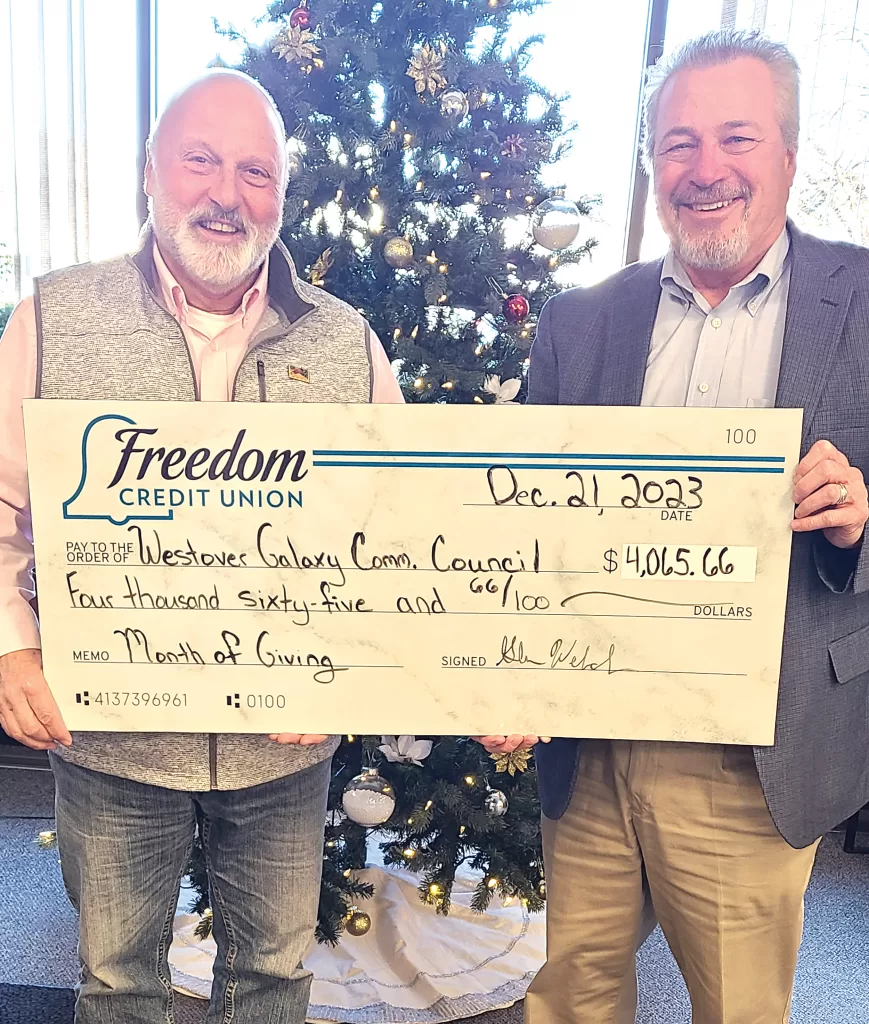
Freedom Credit Union President Glenn Welch (right) presents a check to John Beaulieu, president of the Westover Galaxy Community Council, one of the recipients of Freedom’s Month of Giving campaign.
“Profitability may be reduced, but we have not reduced our commitment to our communities. I think we are a pillar of Greenfield and the broader community,” Albero said. “So we continue to reinvest in the community, and everyone benefits from that.”
A.J. Bresciano, first vice president and commercial loan officer at GSB, agreed.
“Even in a higher-interest-rate environment, we’re taking measures to ensure our impact in the community is not being impacted and not deteriorating. So many local organizations throughout the Pioneer Valley rely on contributions of time, talent, and treasure. We make supporting those organizations a priority at Greenfield Savings Bank, and we want our team members to invest going forward.”
Philanthropic Priorities
Bannister made it clear that banks are required, to some degree, to be involved in their communities in a charitable way, noting that bank examiners make sure a bank’s locations and loan activities are representative of where it does business — meaning not just serving and lending to those with high incomes or profits — and they also ask how the institution gives back to the community.
“The challenge with that is there’s no right answer. We just have to go to the examiners each year and say, ‘here’s what we did.’ And when we give, we make sure a substantial amount that we give away benefits LMI — lower- to middle-income communities.”
Area banks and credit unions have increasingly inspired employees and customers to involved in giving efforts as well. In 2023, Freedom Credit Union contributed $181,898 to more than 70 charitable organizations throughout the four counties of Western Mass.
Of that, corporate charitable giving accounted for $130,432, but throughout the year, Freedom also conducts Month of Giving campaigns, in which customers can support a specific organization each month; those programs raised $17,316 in 2023. And local branch and department giving contributed an additional $34,150 to local charities.
“Our members and staff are passionate about supporting the community where we live, work, and serve,” Freedom Credit Union President Glenn Welch said. “In 2023, we were proud to donate funds for a wide variety of deserving institutions.”
“We give a little to a lot of groups. We don’t tend to do large capital campaigns. One big ‘yes’ often means a lot of little ‘no’s.’ So many nonprofits out there are doing good work, so it feels wrong to say ‘no’ to people.”
Other institutions take customer involvement to the polls. Both Florence Bank and Monson Savings Bank boast popular programs — called the Customers’ Choice Community Grants Program and the Community Giving Initiative, respectively — that complement other bank philanthropy by letting customers vote for nonprofits to support.
Through that initiative, Florence Bank awarded $150,000 to 46 area nonprofits in 2023, the 21st year of the program; the higher-than-usual total commemorated the bank’s 150 years in business.
“It’s amazing to see so many community organizations being recognized, and the fact that the recognition comes from Florence Bank customers in the form of votes is really special,” President and CEO Matt Garrity said.
Meanwhile, in the 14th year of its community-giving program, Monson Savings Bank awarded a total of $15,000 to the 10 top vote-getting nonprofits.

A team of PeoplesBank employees volunteers at Kent Memorial Library in Kent, Conn.
“Everyone’s passion for our annual Community Giving Initiative is always so exciting,” said Michael Rouette, the bank’s executive vice president and chief operating officer. “As a locally operated bank, Monson Savings has a great desire to support the residents, businesses, and nonprofits of the communities that we work in and live in.”
President and CEO Dan Moriarty added that “these organizations are worthy nonprofits that supply important resources to our communities. It is clear why they were chosen by our community members to receive support from Monson Savings.”
More Than Money
But community banks and credit unions in Western Mass. aren’t just giving money; many also emphasize a culture of volunteerism, even providing time for their employees to get involved in the community.
For example, employees at UMassFive College Federal Credit Union raised more than $18,000 for two local nonprofits last fall — $13,677 for the UMass Cancer Center via participation in the UMass Cancer Walk and Run, and $4,800 for the Food Bank of Western Massachusetts via participation in Will Bike 4 Food.
A supporter of the UMass Cancer Walk and Run for more than 20 years — during which time it has raised more than $186,600 for the cause — UMassFive employees join together annually as Team UMassFive to raise funds, both personally and in branch locations. In 2023, fundraising efforts included raffle baskets, bake sales, candy sales, and art and jewelry sales, and the credit union’s corporate partners also pitched in.
Will Bike 4 Food is a more recent priority at UMassFive, as employees have taken part since 2020, raising a total of $17,500 in just four years, which equates to providing 70,332 meals to neighbors in need.
“We are so proud of our employees for supporting local causes that they care about,” said Cait Murray, Community Outreach manager at UMassFive. “Together, our team can make a more significant impact than if we all participate in events on our own. These organizations make such a big difference in our communities, and we are thrilled to support those efforts.”
Country Bank reported that its team members volunteered 1,255 hours of community service in 2023, while 37 team members served on 65 nonprofit boards and committees.
“Oftentimes, we can supplement or replace a monetary donation with volunteers, whether it’s picking vegetables at a local farm to be donated out, or helping nonprofits clean up the facility, or doing outdoor work like volunteering with Habitat for Humanity,” McGovern said. “We’re still putting the bank’s dollars to work, but the hands of our employees are helping to sustain some of these nonprofits as well.”
Liberty Bank reported 13,721 employee volunteer hours, including nearly 170 hours at Connecticut Foodshare, the aforementioned recipient of the bank’s holiday gift in 2023. The bank also actively solicits nonprofits to share information on what types of volunteer help is needed — whether working on a project or serving on a board or committee — and aims to meet those requests.
At PeoplesBank, employee volunteerism is considered part of the bank’s culture, Bannister said — part of its DNA, in fact, and something made clear to job applicants.
“We report volunteer hours to the bank examiners, and we were third in the state last year in hours volunteered per employee. It’s something that’s expected, and it’s something that builds camaraderie,” he said.
And it’s something that community banks simply should do.
“We’re more engaged in the community, where national banks are not known for that as much,” Bannister told BusinessWest. “And we consider it a competitive advantage. When you’re choosing a bank, hopefully the bank’s values are something you consider, and hopefully that volunteerism reflects well on the brand.”
A Visionary Approach
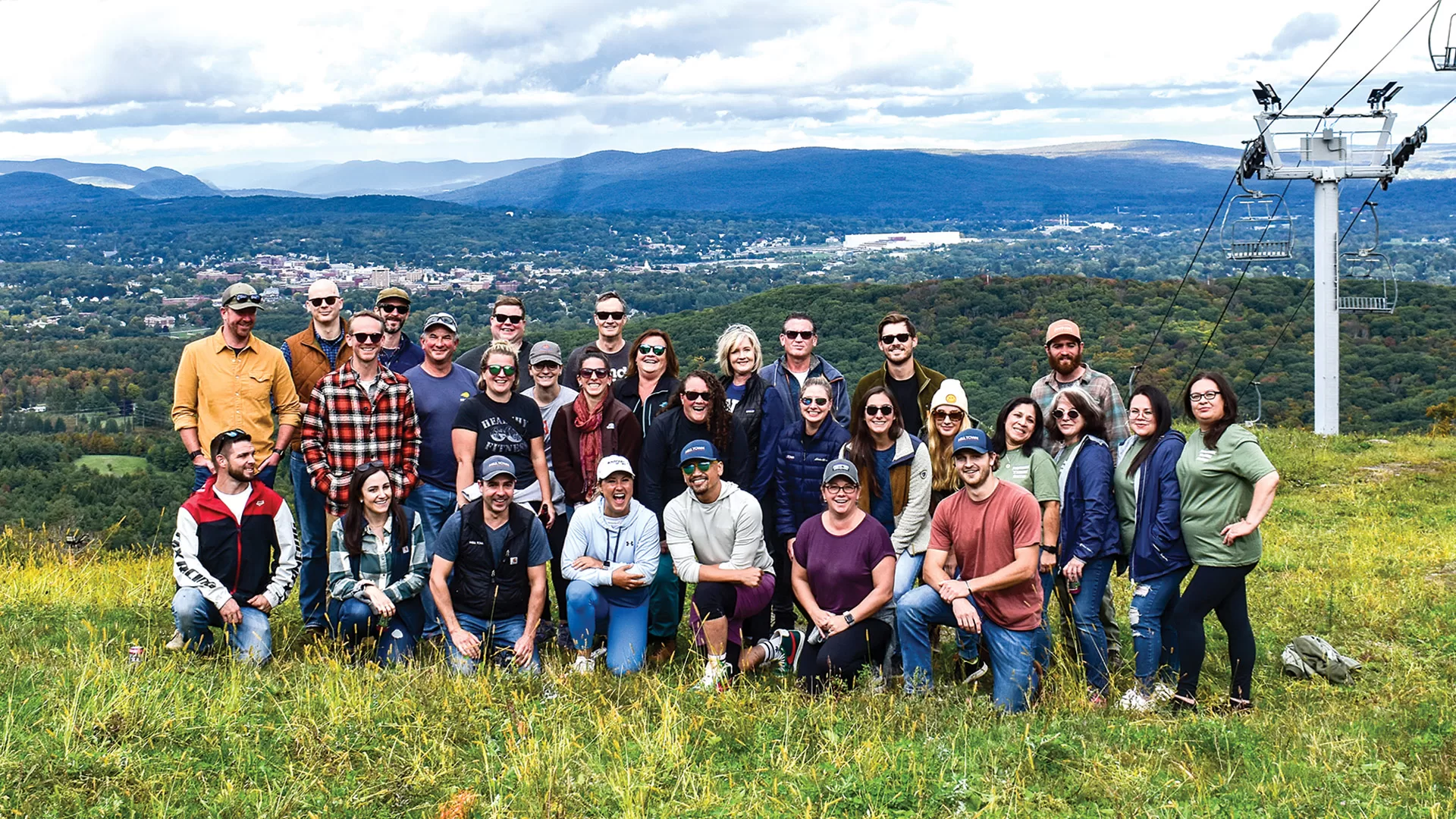
The Mill Town Capital team atop Bousquet Mountain Ski Area.
Real-estate development can be a profitable business. In fact, it’s safe to say that’s the key driver for most players in this sector.
For the team at Mill Town Capital, it’s about impact — on more than the bottom line.
Formed in 2016 and based in Pittsfield, Mill Town is an “impact investment platform,” said Tim Burke, the company’s CEO. “Our overall mission and mandate is to really make the area of Pittsfield and the Berkshires a better place to live through traditional investments, impact investments, and pure philanthropic community work.”
But what is impact investment?
“To us, impact investment means focusing on key assets or amenities or projects that have a high potential positive impact on the region,” he explained. “So it’s a little bit different than maybe a traditional impact investment that might look at energy or other areas of impact. Ours is really place-based in terms of our approach.
“When we think about impact, it’s taking on investments that most traditional investors wouldn’t take on either because the rate of return is lower, or it takes a much longer time to realize it, or they’re just really difficult projects,” he added. “We’re not necessarily restrictive to different sectors or industries. It’s really about, is this project good for the region? Is it good for the local economy? Does it have the chance to spur economic development or other potential investment, and, if so, how can we make it work?”
The company’s first ventures into real estate centered on housing-development projects in Pittsfield.
“Impact investment means focusing on key assets or amenities or projects that have a high potential positive impact on the region.”
“Pittsfield used to be a 60,000-person city, but now has 40,000 people. So you would think that there is enough housing for everyone, but the stock itself is significantly deteriorated,” Burke explained. “You have a lot of really old stock, things that are run down, properties where absentee landlords have a lot of deferred maintenance. And the living conditions in some of these are really tough.”
Since taking what he called a “clustered approach” to housing stock in the area, Mill Town has accumulated more than 200 units of housing in Pittsfield alone, as well as a few commercial buildings and mixed-use properties, with apartments on the upper floors and commercial space on the lower floors.
“So the real-estate approach there has been trying to improve neighborhoods with housing at the forefront, but also supporting small businesses and restaurants where we can.”

Tim Burke calls the Bousquet complex “a critical local asset that had fallen on some tough times.”
Public investment has sometimes followed that private investment, Burke said, with the city or state coming in with utility upgrades or streetscape improvements.
“So it’s really a multi-faceted approach, and it certainly has a patient-capital component to it as well, where we’re not looking to get in and monetize things really quickly. We have more of a patient, long-term approach to it.”
On the business-enterprise side of the ledger, Mill Town now owns about a dozen local businesses, either directly or in partnerships.
One example is Bousquet Mountain Ski Area, one of the oldest continuously operating ski areas in the country. “We felt that’s a great example of a critical local asset that had fallen on some tough times and needed a lot of investment,” Burke said. “I don’t think many rational investors would have gone in there with a pure investment business case, but we felt like it was worth saving.”
These enterprise investments tend to be clustered in regional assets in real estate, recreation, and hospitality, such as the Central Downtown Inn & Suites in Pittsfield; Gateways Inn in Lenox; Blueprint Property Group in Pittsfield; Framework, a Pittsfield co-working space; and others — about a dozen in all.
“We’ve been involved in those types of projects for a number of years, some of which are business-oriented projects, and some are philanthropic, that we do through our our 501(c)(3) foundation. That includes things like improvements in Springside Park, which is a large, local park in Pittsfield where we helped reshape and reinvest in trail networks there.”
Tim Burke
“Is this project good for the region? Is it good for the local economy? Does it have the chance to spur economic development or other potential investment, and, if so, how can we make it work?”
Mill Town has also provided contributions to the Berkshire Natural Resources Council for a project that connects the various trail networks in the Berkshire mountains.
“And then we have two businesses that are in the recreation space,” Burke said. “We own an athletic center that’s called Bousquet Sport, which is across the street from the ski area, where we’re currently undergoing a 15,000-square-foot addition plus renovation to the facility, and that’s an investment in tennis, fitness, and pickleball.”
Then there’s Camp Arrow Wood, where the former Lakeside Christian Camp on Richmond Pond was converted into a new, sleep-away summer sports camp.
“We run three- and six-week summer camp sessions out of that property. That’s another project that we kind of uncovered during the COVID period … and we’ve been building that up over the past year and a half or so.”
Coming Home
Prior to Mill Town, Burke spent a number of years in corporate finance roles with United Technologies and then later with a couple different biotechnology companies, most recently Biogen in Boston’s Kendall Square biotech cluster.
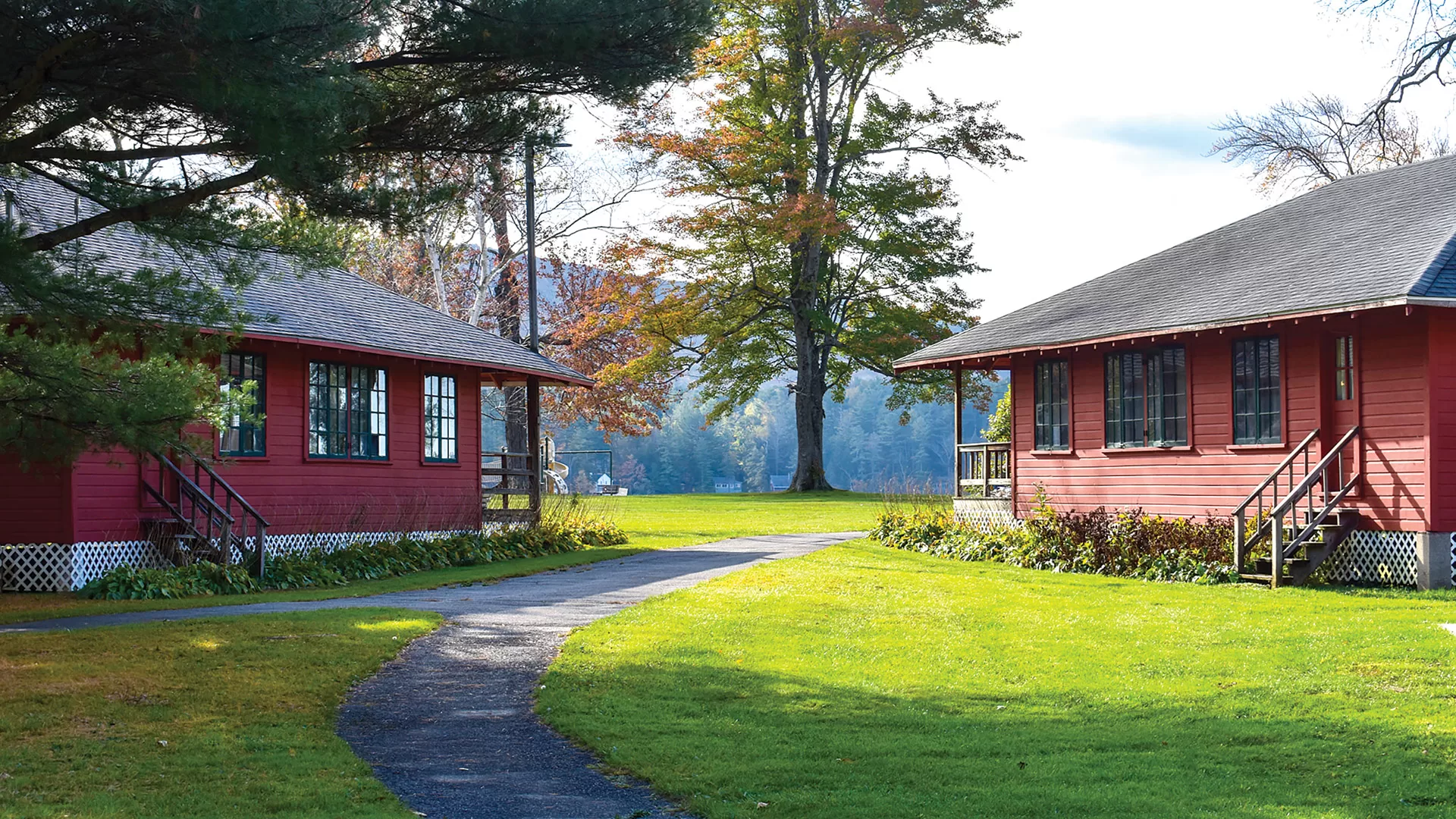
Mill Town transformed the former Lakeside Christian Camp on Richmond Pond into Camp Arrow Wood, a new, sleep-away summer sports camp.
But his connection to Pittsfield was strong, having grown up there, and around 2015, he met Dave Mixer, Mill Town’s founder “and really kind of the motor and the initiative and the capital behind everything that we do,” Burke said. “So I ended up meeting with Dave, and he had a general idea of what he wanted to do.”
Mixer, like Burke, is a Berkshire native and had just come back to the area after being away for a long period of time, and he wanted to make an impact, Burke explained.
“His view of making an impact is a little bit non-traditional from a philanthropic standpoint. He didn’t want to just write checks and then walk away. He really wanted to see if he could drive economic development and job growth and population stabilization and new housing and educational improvements — all across the spectrum of economic development and quality of life.
“It’s been a great, challenging, unique run for us over the past six or seven years, and we’re at a point now where, through Mill Town and our businesses, we employ over 300 people in the area. We’re constantly looking to grow and make this engine work and also kind of preach what we’ve learned over the years to other communities and people and investors and philanthropists and see if there are ways we can help other areas progress with what we’ve done in Pittsfield.”
“I think we’re pretty hard on ourselves in that we think we have a ways to go before we achieve the impact that we want to achieve. But it is validating to a certain degree that people see that we’re heading in the right direction.”
Indeed, Burke firmly believes Mill Town has a replicable model, but it’s one that’s still evolving. “We think we’re in the second or third inning of what we’re doing here in Pittsfield.”
And as someone with a lifelong heart for the city, he envisions what a vibrant, thriving Pittsfield can one day be.
“I think it’s a place where people from all aspects of the economic spectrum can find quality housing. They can send their kids to schools and get them a good education. They can find jobs that will allow them to live here productively and raise a family.
“And then we can provide those systems on the periphery that allow people to have a good quality of life here — places where kids have opportunities to have athletic endeavors in camps, places where adults can enjoy the natural assets that the area has,” he went on. “That comes back to trail networks and all the outdoor recreation assets that we have here.”
After all, he added, those are some of the things the Berkshires are most known for.
“Making sure that we can maximize those benefits for the people of Pittsfield is where we want to make a difference,” Burke told BusinessWest. “That involves a lot of different things and broader socioeconomic issues that are much harder to solve, like education and poverty and addiction. But we still should try to get involved in some of those things through partnerships with organizations who have that expertise.”
Moment of Recognition
Last fall, at 1Berkshire’s Celebrate the Berkshires event, Mill Town Capital was recognized as a special honoree for “putting the Berkshires on the map” — an honor that recognized the company’s investments in housing and downtown redevelopment, as well as its philanthropic support around the region.
“When our regional economic-development group recognized Mill Town for the work that we’re doing, it was tremendously gratifying for our team to see that people see the work that we’re doing and that it is having a positive impact,” Burke said. “I think we’re pretty hard on ourselves in that we think we have a ways to go before we achieve the impact that we want to achieve. But it is validating to a certain degree that people see that we’re heading in the right direction.
“That hasn’t always been the case,” he added. “I think when we first started out, there was a lot of skepticism and questioning: ‘what’s the angle?’ ‘What are you trying to accomplish?’ So it was great to see that, at a minimum, people view it as positive-intent work that has the potential to drive change.”
Big Ideas in Small Towns

Lucy Damkoehler has developed a strong following from both within and outside Franklin County for her bakery and cooking classes.
When Lucy Damkoehler returned to Western Mass. after 20 years away, she opened a bakery in a town she knew well — Bernardston, to be exact, with its population of 2,000.
That was in 2018. Today, Sweet Lucy’s Bakeshop is thriving, demonstrating, like many other businesses already have, that it’s possible to succeed in a county whose 26 communities total around 71,000 residents — less than half of Springfield alone.
“It took off right away,” she said. “My prices were competitively high. I knew the cost of food was going up and the cost of labor was going up, so I priced it so I didn’t have to change my prices too often. But people didn’t complain about it, and I felt like it was doing pretty well.”
When COVID shut down much of the world, Damkoehler pivoted to a concept called Take & Bake Meals, which, at its height, was sending 50 to 60 meals out the door each day, which wound up expanding her reach and widening her exposure.
“We were getting people from Connecticut, from New York, discovering us,” she recalled, and those days partly explain why her customer base went from 90% local before 2020 to a ratio today of about 60% repeat customers — who come anywhere from every day to once a month — and 40% travelers checking out the bakery for the first time.
And Damkoehler’s success continues; she used a crowdfunded grant and a bank loan to build an addition, doubling her kitchen space and allowing her to begin offering cooking classes last September. She now employs six full-time bakers and six front-of-house staff, and is looking to hire a chef instructor as well.
“It blows my mind that I’ve only had one class that’s had to cancel due to low enrollment. They usually sell out within a couple of weeks, if not days,” she told BusinessWest. “It shows there’s a major need for that part of the business; there’s nothing like that around here. We’re doing kids’ classes now, too.
“I’m amazed every day that we’re able to do this successfully,” she added, especially in a community of just over 2,100 residents. “The prices are not cheap. But people recognize the value, and they appreciate it, and they’re willing to spend more money on something that’s done right. It doesn’t scare people away.”
So that’s what Damkoehler brought to the table: talent, quality, drive, and the instincts to pivot to what the market needed, which, both during the pandemic and with her classes, generated further opportunities for growth. Meanwhile, other businesses throughout this mostly rural county bring their own differentiators, but they also testify to a supportive, if small, community.
“Business owners here who are thriving have really committed, loyal customers. They have customers who love to come out and spend time there, spend their dollars with them, and they’re focused on providing a really great experience every time someone comes in,” said Hannah Rechtschaffen, director of the Greenfield Business Assoc. (GBA).
“One thing that I hear from some business owners is a sense of community and mutual support,” she added, noting that one of the GBA’s goals is to keep building opportunities for business owners to know each other better, so they can recommend each other.
“I think it’s organizations like ours and like the chamber that are able to listen to business owners and respond and really be another set of hands in their business success. That’s not overrated when you’re wanting to have a brick-and-mortar presence. So I hope businesses will think about opening here; I hope businesses will think about opening a second location here.”
“We were getting people from Connecticut, from New York, discovering us.”
To that end, Rechtschaffen added, “when we’re in conversation with Greenfield Community College about getting an internship program going, or when we’re in conversation with the Franklin County CDC about small-business support and entrepreneurship, all of those relationships are so, so crucial. None of us want to feel like we’re toiling away alone. We want to feel like we’re part of a larger ecosystem.”
Jessye Deane, executive director of the Franklin County Chamber of Commerce and Regional Tourism Council, agreed.
“Partnership and collaboration are the special ingredients in Franklin County. The way our communities come together to support our small businesses, it’s not like anything I’ve seen elsewhere,” she said.
“What I love to see here are thoughtful partnerships and strategies around how to best support business owners in filling in some gaps and resources that some more populated areas have, and how to attract different industries to the area,” she continued, touting, as Rechtschaffen did, the partnership between the chamber and GBA, but also Greenfield Community College, the CDC, and various economic-development entities.
“We want everyone’s business to be as successful as possible and have as many resources as they can tap into to ensure that success,” Deane said. “We wake up every day asking how to best support them.”
Declining Numbers
Such partnerships and mutual support are especially meaningful in a county that, after years of plateauing population, has seen those numbers start to creep downward, especially in the small towns beyond Greenfield and Deerfield.
“Certainly, population decline — or the projection of population decline we see — is a pretty major threat to many rural parts of Massachusetts,” said Linda Dunlavy, executive director of the Franklin Regional Council of Governments. “As Baby Boomers age, we need help, and not attracting young people to our region will be a concern for us. So we’re working on that.
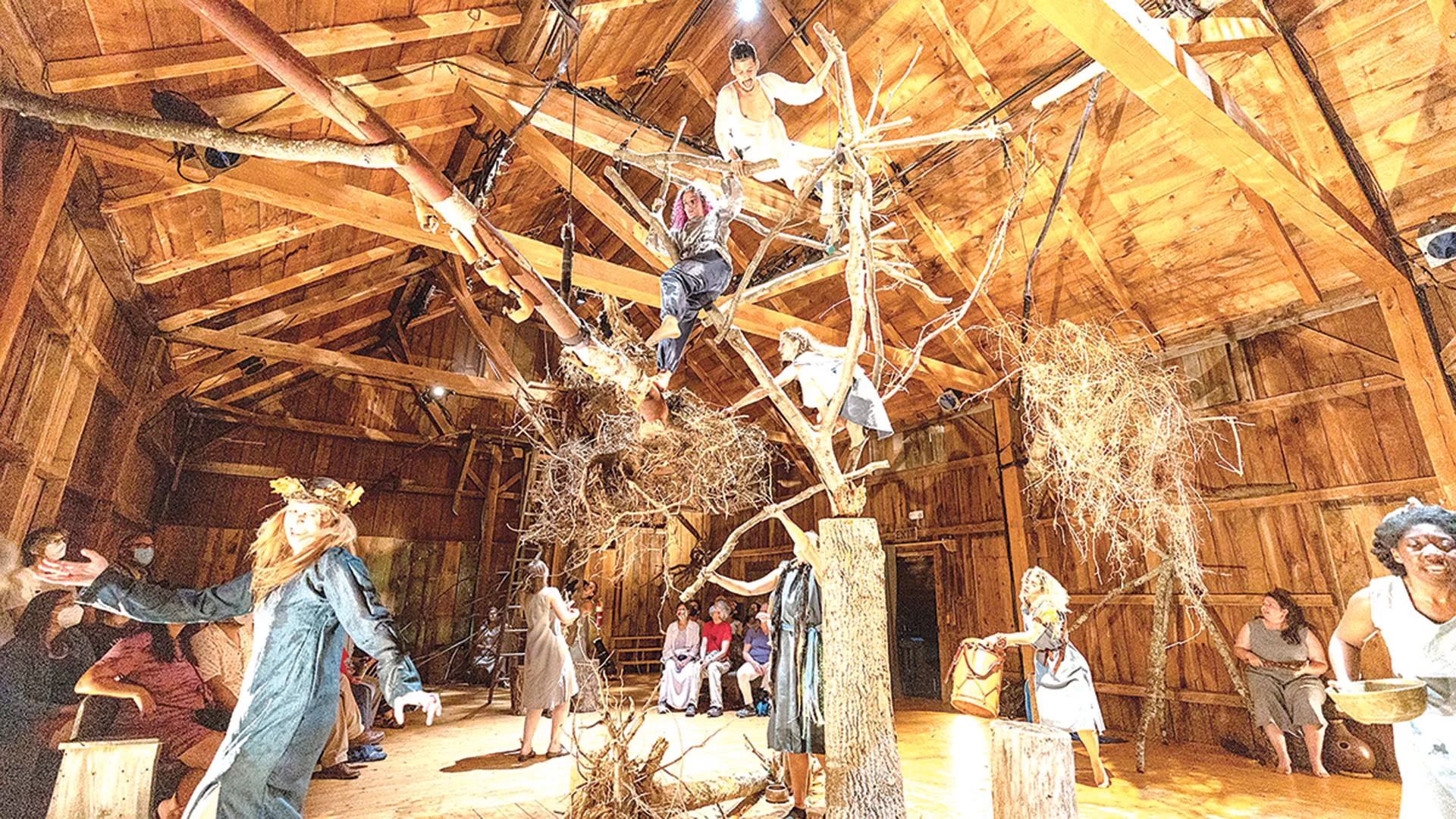
Double Edge Theatre in Ashfield is just one example of the many cultural offerings in Franklin County.
“But population decline also hurts Franklin County and its rural areas because so many state and federal funding formulas, the distribution of aid money to municipalities, is based on population,” she continued. “So as our population decreases, the amount of money we have for infrastructure improvements, for education, etc., also decreases, which compounds the problem: how do we get people to come to our region if we’re not caring for our infrastructure, our assets, adequately?”
Dunlavy, who was named one of the Difference Makers for 2024 by BusinessWest, has been working for the benefit of Franklin County for decades, so she understands its assets — from arts and culture to outdoor recreation to that supportive business community others mentioned — but she understands the challenges of an aging, shrinking population base, too.
“Because we’re so rural, we have to work together,” she told BusinessWest. “We are a very collaborative region, probably one of the most collaborative regions in Massachusetts, because all the regional organizations are working together. We combine services of municipalities, our businesses work together, and they are served by strong regional support systems. It’s a great region to live in — if you know about us.”
A.J. Bresciano, first vice president and commercial loan officer at Greenfield Savings Bank (GSB), has been lending in Franklin County for the past 16 years, and he feels good about the current strength of business activity in the region.
“In terms of business lending, I think there’s some growth and some optimism, post-pandemic, in starting businesses and seizing opportunities to capitalize on improving economic markets. I think there is some opportunity for people with great ideas and a passion for what they do to come in and start something new,” he told BusinessWest.
That said, “there are certainly some challenges in the interest-rate environment,” he added, especially on the residential side, where higher rates and a shortage of housing have taken away the ‘churn’ of a vibrant market. “But I think that will change. Hopefully we’ll see rates start to come down in the near future, which will give people an opportunity to go out and seek new opportunities. We’re pretty optimistic about what the future holds.”
On the plus side, “there’s a lot of interest in this market because it’s less expensive than other markets that are overdeveloped. So a lot of borrowers see opportunity here,” said Peter Albero, chief financial officer and treasurer, noting that GSB originated $100 million in commercial loans and $70 million in residential loans last year. “The residential side is still a little bit lower … but the commercial side is very strong. A lot of banks are competing for strong borrowers.”
The aging of the population has created a fair amount of business turnover, Bresciano added, as long-time business owners are looking to retire and move into the next chapter of their lives.
“So there’s definitely opportunity for someone else to come in with new ideas, new ambitions, and to cultivate a new environment,” he said, pointing to one project — the conversion of the former Wilson’s Department Store in downtown Greenfield to a mixed-use property — as an example of forward thinking.
“None of us want to feel like we’re toiling away alone. We want to feel like we’re part of a larger ecosystem.”
For her part, Deane has seen a pipeline emerge of younger leaders in many Franklin County communities as older leaders, like those older business owners, look to retirement. “I’m excited about the leadership we’re seeing step into those roles,” she said.
Plenty to Promote
Rechtschaffen is acutely aware of what a spread-out county like Franklin faces in terms of housing, transportation, and access to amenities, but she tends to light up when talking about what she loves about the region — and there’s a lot of that.
“We have so much amazing outdoor arts, outdoor activities, whitewater rafting, skiing, theater … there are so many things. So I always want to make sure that people know what there is to visit up here.”
The target audience isn’t just visitors from afar, though.
“We have an advantage in Franklin County, which is that people really do want to support local, so it’s important that we have the right retail mix and experience mix here for people to be able to do that,” Rechtschaffen said, which is the impetus behind efforts like the “find it in Greenfield” campaign running on Bear Country radio and through other outlets.
“A lot of people don’t realize what’s so close by. So getting the word out can be a challenge,” she added. “We’re really trying to keep beating that drum and making sure that things are affordable, things are accessible, and we’re bringing businesses into Greenfield and Franklin County that people really want. That’s also a crucial part of the puzzle.”
Dunlavy has helped put many pieces in place, from north-south rail to broadband access to a planned partnership with other regional councils of government on a Connecticut River climate-resiliency plan.
“You do nothing alone. Everything takes partnership and many people working together,” she said. “And I like that part of the job. I like that challenge, and I like that focus. I’m never bored, ever. There’s always something to work on and always something to think about.”
Rechtschaffen never stops thinking about Franklin County, either.
“This is really creative work,” she said, “to be problem solving, to be listening, to be connecting people with one another so that their business can thrive, maybe in ways they didn’t think about. I really love all of this work to grow Greenfield and Franklin County in a way that feels good, for as many people as possible.”
Current Events
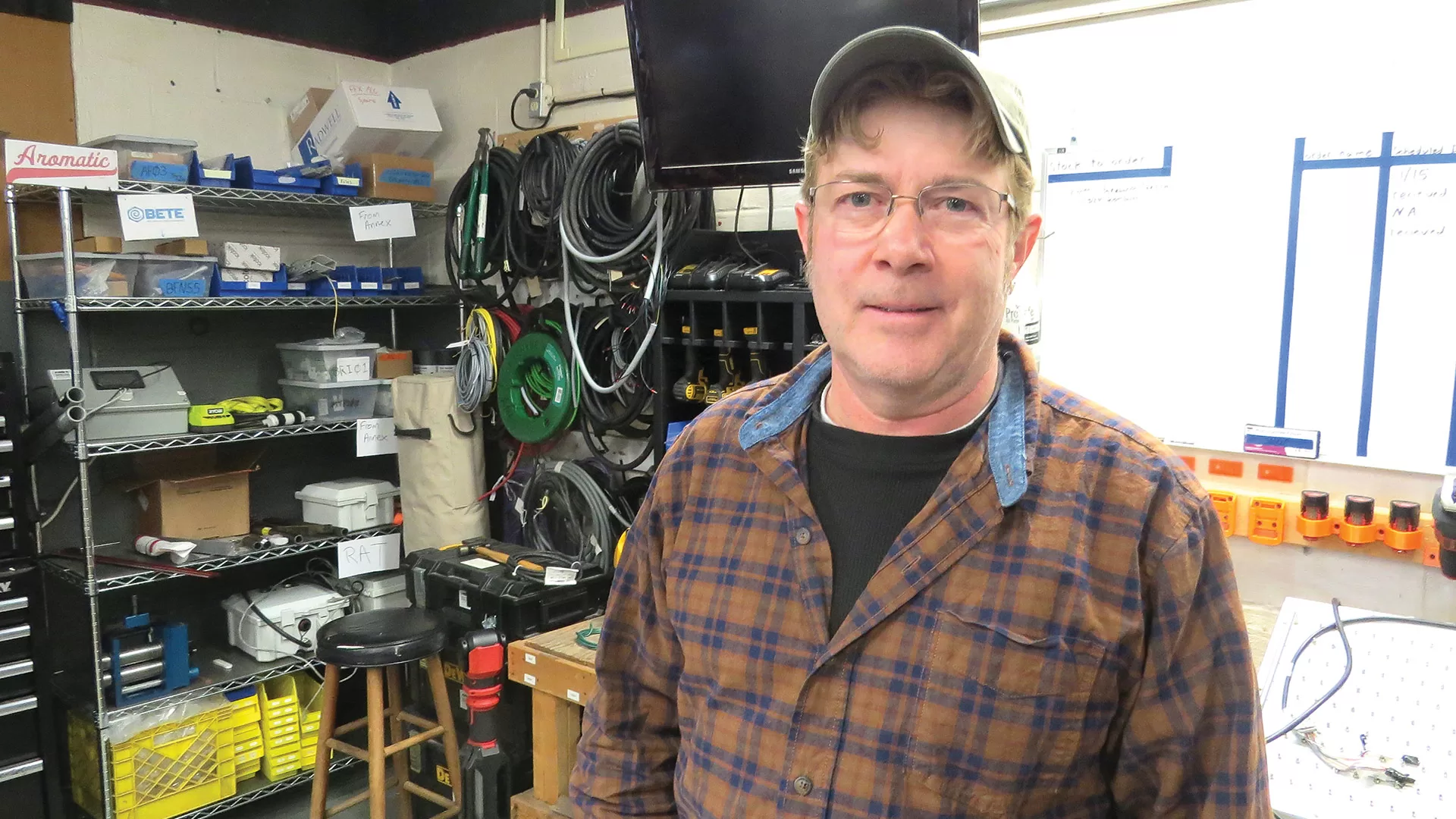
Randy Ames says robotics will be the main focus of the next chapter in the intriguing Ames story.
As he talked with BusinessWest, Randy Ames gestured out the window of his tiny office to the traffic on Greenfield Street just a few dozen feet away.
He guessed that several thousand cars pass that spot every day, and further speculated that few, if any, of those travelers would have any idea at all what goes on inside the small, nondescript building that has been home to his business for the past 15 years.
That’s a pretty safe bet, actually. In fact, it’s easy to drive right by Ames Electrical Consulting without knowing it’s there. And soon, it won’t be there.
Indeed, as he talked, Ames noted that he was in the very early stages of packing up for a move to much larger quarters in Greenfield Industrial Park, just a few miles away. That move is a big part of an exciting next chapter in one of the more intriguing, and still evolving, business stories in Franklin County.
The first chapter saw Ames abandon a career, if it could be called that, as a chef — because he needed something more financially rewarding as he started a family — and enroll in an electrical engineering technology program at Springfield Technical Community College.
“Manufacturers can’t find people to work — and it’s not just manufacturers, it’s everyone.”
The next chapters would see him put that degree to work in jobs for several different companies in the region — from Elm Electrical in Westfield to Kellogg Brush in Easthampton — while also earning a degree in electrical engineering at Wentworth Institute of Technology in Boston on weekends (“three years of Saturdays,” as he called it), and also doing a little of what he described as “moonlighting.”
Specifically, he was developing and installing systems to help businesses automate various operations and processes.
Eventually, and with some real incentive after he was pink-slipped by a downsizing Kellogg Brush, his work with automation evolved from moonlighting into a risk-laden entrepreneurial venture, one that somehow managed to survive the Great Recession of 2008 and 2009, when OEMs that made the equipment he installs all but shut down.
Today, Ames boasts clients in a wide range of sectors, from breweries to plastics; food and beverage to paper; recreation (think ski lifts) to municipal water and wastewater facilities. Indeed, the company designs electrical hardware and software control systems for companies that make everything from golf balls to Play-Doh to ketchup bottles.
“We’re the automation guys,” Ames said simply, adding that, over the years, the company has enjoyed steady growth while expanding and diversifying its portfolio of customers, which it provides with turnkey operations.
The next chapter for Ames, and a big reason behind its move to larger quarters, involves the growing, ever-changing world of robotics.
The company has become New England’s only authorized distributor and integrator of NACHI Robotics Systems, said Ames, adding that, as manufacturers and machine shops across the region and throughout the Northeast continue to struggle to attract and retain employees, more of these companies are increasingly looking to robots and cobots (‘collaborative robots’ that work together with people) as a solution.
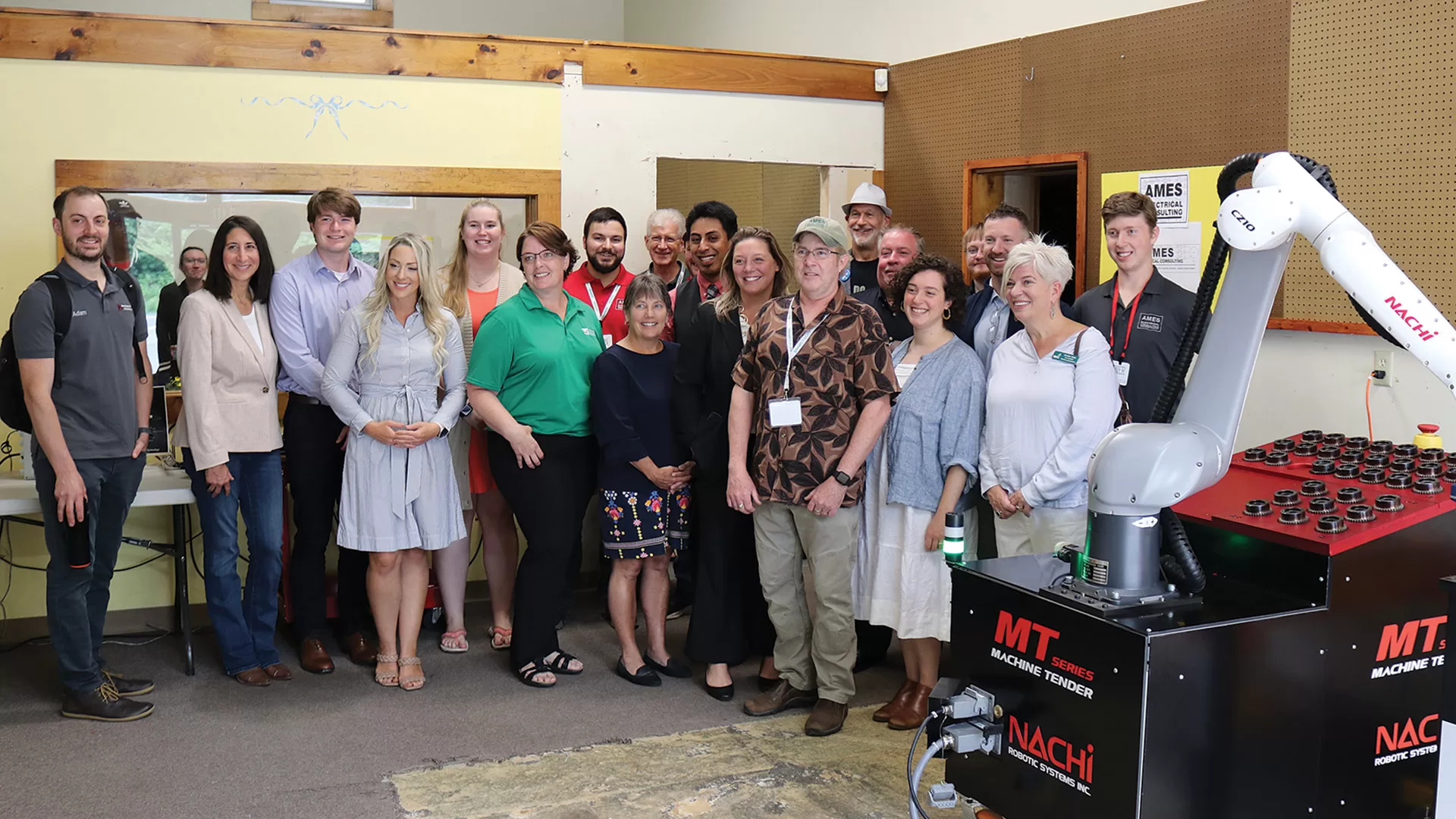
Randy Ames, center, and a large delegation of local, state, and business leaders gathered at the company’s facility in Deerfield last summer for the NACHI Robot Roundup.
“Manufacturers can’t find people to work — and it’s not just manufacturers, it’s everyone,” said Ames, adding that his company is now primed and well-positioned to take full advantage of this technology and what it can do for companies.
It was this next chapter and what it might it might mean for the company and the region that drew business leaders and elected officials — more people than had come to his door in decades — to the office on Greenfield Street last summer for what was dubbed the NACHI Robot Roundup.
At that gathering, attendees got a good look into the future — of manufacturing, Ames Electrical, and, in many respects, the region.
For this issue and its focus on Franklin County, BusinessWest takes an in-depth look at Ames and what comes next for a company where success hasn’t come automatically, but through entrepreneurial energy and a willingness to keep current — figuratively, but also quite literally.
Watt’s Happening?
Ames joked early and often about the acronyms that dominate his business.
There are many of them — from PLCs (programmable logic controls), which are small devices, “the heart of automation,” as Ames called them, that can be programmed to turn things on and off; to HMIs (human-machine interfaces), the operators’ touchscreens; and even RAT (remote access technology), which provides a secure, cloud-based IT network that allows Ames to access remote locations and control machines with just a few clicks.
These acronyms come together in an industry, and a business, that has emerged, grown, and evolved over the past four decades, and continues to do so.
As noted earlier, Ames was a chef before enrolling at STCC and then working at Elm Electrical and then Kellogg Brush and eventually starting that moonlighting with automated systems.
He started in 1992 at Yankee Candle as it was opening its village in South Deerfield, specifically with developing, building, and programming ‘Santa’s toy machine,’ which made it appear that toys were going into a huge box in pieces and coming out as finished products.
“Part of it was to make it sort of this Willy Wonka/Rube Goldberg machine-looking mechanical contraption,” he recalled, adding that he worked with Yankee Candle founder Michael Kittredge on the project. “He said, ‘I want it to do this … I want this valve to make this thing spin, and all these lights to blink, the conveyer to run, to turn the snow on and off in the windows outside, etc.’ I’ll bet there were 25-foot-diameter gears on the wall with little motors that I had to make run.”
From there, Ames worked with several other moonlighting customers offering their own versions of ‘I want it to do this.’ Those experiences provided him with the confidence to go into business for himself in the spring of 1992 when he was laid off from Kellogg Brush as it was downsizing.
“I made four phone calls that day, and three people called me back,” he said, adding that one of them was Hillside Plastics in nearby Turners Falls, which would go on to be a steady customer.
He initially operated out of his house in Montague, working there during the day and then for OEM Kingsbury Corp. in New Hampshire at night, before focusing exclusively on his own work.
Over the past 30 years, the company has survived disruptive forces ranging from the Great Recession, when the phone stopped ringing and he started thinking about returning to work as a chef, to the pandemic, and thrived mostly by growing and diversifying its portfolio of customers while developing strong partnerships with both those clients and the makers of the equipment it installs.
Elaborating, Ames said the company takes a collaborative approach to what amounts to finding solutions for a client, whether it’s a manufacturer looking to automate a production process or a municipality operating its wastewater treatment plant.
He said the phone started ringing again in 2011, and with few exceptions, it hasn’t stopped ringing since, with customers finding Ames mostly through its vendors and all-important word-of-mouth from existing clients. Along the way, it has developed a niche — mostly smaller systems — and a reputation for being able to move quickly and nimbly, separating it from its much larger competitors.
Most of its customers are along the I-91 corridor in Western Mass., but it has also expanded into the North Shore, the Worcester area, and other parts of New England.
This expansion process may be accelerated by the partnership with NACHI Robotic Systems, Ames said, noting that a growing number of companies, including machine shops, are looking to robots as their workforce challenges mount.
“Manufacturers are tired of the revolving door,” he explained. “They bring someone in, they train them for a week, and then they’re gone. So, increasingly, they’re looking at robots.”
Indeed, he said he’s taking calls from potential customers ranging from bakeries to machine shops exploring the possibility of using robots to handle some of the work currently carried out by people.
Elaborating, Ames said he’s given two quotes to machine shops for robots that can handle what’s known as ‘machine tending,’ yielding yet another acronym (MT). And as he talked, he played a video of a NACHI robot picking and placing parts and putting them into a chuck on a computer numerical control system.
“This machine costs $92,000 — it comes with a cart and a robot,” he told BusinessWest. “If you can keep loading that, it will work all day and all night long; we just quoted one company where the ROI on one of these was three months.”
The company hasn’t installed any robotic systems yet, but Ames said the pace of phone calls inquiring about the equipment and what it can do has certainly picked up over the past several months. And he expects that call volume to only increase as workforce issues across all sectors continue.
Wired for Growth
Returning to the matter of that Willy Wonka/Rube Goldberg contraption he developed for Yankee Candle, Ames said that Michael Kittredge, who passed away in 2019, told him years ago that someone from the Smithsonian Institution called, saying they would be very interested in putting it on display once Yankee Candle was done with it.
Unfortunately, the toy machine had been taken down and dismantled by that time, Ames went on, adding that he never thought about his work winding up in the Smithsonian one day.
Instead, he’d gladly settle for satisfied customers and continued growth of the business he started from scratch and developed into something that has remained on the cutting edge of an emerging sector.
You certainly can’t see any of that driving past the company’s soon-to-be-former home on Greenfield Street, and that’s part of this engaging story — one with some intriguing chapters still to come.





